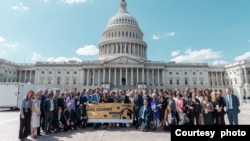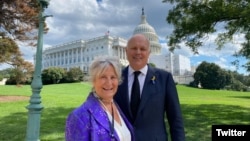As capitals in Central Asia roll out the red carpet for China’s top official this week, a growing network of key lawmakers from 28 nations and the European Union, major powers among them, believe the treatment for President Xi Jinping should be anything but.
“The already abysmal human rights record of the [People’s Republic of China] government is deteriorating further still,” read a joint communique issued Wednesday at the conclusion of the second summit held by the Inter-Parliamentary Alliance on China (IPAC).
“The PRC government continues to deny its citizens freedom of expression, thought, conscience and religion, while practicing mass surveillance, arbitrary detention and enforced disappearances against opponents to its rule,” it said.
The IPAC summit was attended by more than 60 lawmakers who flew to Washington from around the world. Since IPAC was founded in June 2020, its member delegations have more than tripled, bringing together legislators from five continents.
Beijing has often accused the United States of being behind any pushback against its growing global influence. But a quick look at IPAC’s membership shows that among the group’s 29 delegations, Britain, Canada, Japan, Australia and the European Union all are better represented. The Swedish and Irish delegations also equal the American one.
The group, now featuring nearly 300 lawmakers, held its first summit in Rome last year.
Though each country’s lawmakers decided to join IPAC for “slightly nuanced reasons,” a common thread runs through their decisions and their commitment to IPAC’s joint plan of action, Iain Duncan Smith, a key lawmaker in the British Parliament, told VOA.
“We’re all together on this simple basis: that we consider the nature of China, the growth of China, the power of China, the military ambition of China, as threatening,” said Smith, a one-time British Conservative Party leader.
He founded IPAC with his Labor Party colleague, Helena Kennedy, one of Britain’s most distinguished lawyers and a prominent human rights campaigner.
Each member delegation is led by two co-chairs, “one from the left, one from the right,” Smith said, believing such a format reflects the nature of democratic societies and forms the basis for the group’s strength and resilience.
He maintained that to counter Chinese state power, that strength and resilience will be needed.
Single greatest threat
“I think China poses the single greatest threat to the liberal order and the free market because they have built up – thanks hugely to massive investments from the West – the world’s second-largest economy and, who knows, maybe could become the world’s largest economy soon, so that makes them much more potent in a way than Russia,” Smith said.
“Secondly, I see the two together,” he continued. “Because I see totalitarian states as a threat to the liberal order, and China is probably the most significant of them.”
Catalin Tenita, a co-chair of the Romanian delegation in IPAC, also worries more about China than Russia, despite the latter’s unprovoked war in Ukraine. “We don’t need another Russian-style player with ten times the economic power,” he tweeted.
Smith sees China as having improved on the original Soviet model by realizing that it needed a growing economy to fund its growing military, policing and foreign influence operations.
“Our problem is we helped them do this without thinking further than a few days as to what the consequences would be every time we get them to build things, to sell us things,” he said, adding that during these transactions, “we become more dependent on them, and less likely to challenge them. I think we have to reverse that.”
What makes China a top concern, Smith said, is that it not only practices a style of government widely viewed as authoritarian or even totalitarian, but it also sees itself as an example that others should follow. “And that’s the threat,” he said.
Smith said his group’s central message to their own and like-minded governments is, “Don’t enable them further, don’t enrich them further, don’t give them more tools, as we’ve seen what they’ve done with the money and the tools” they have.





